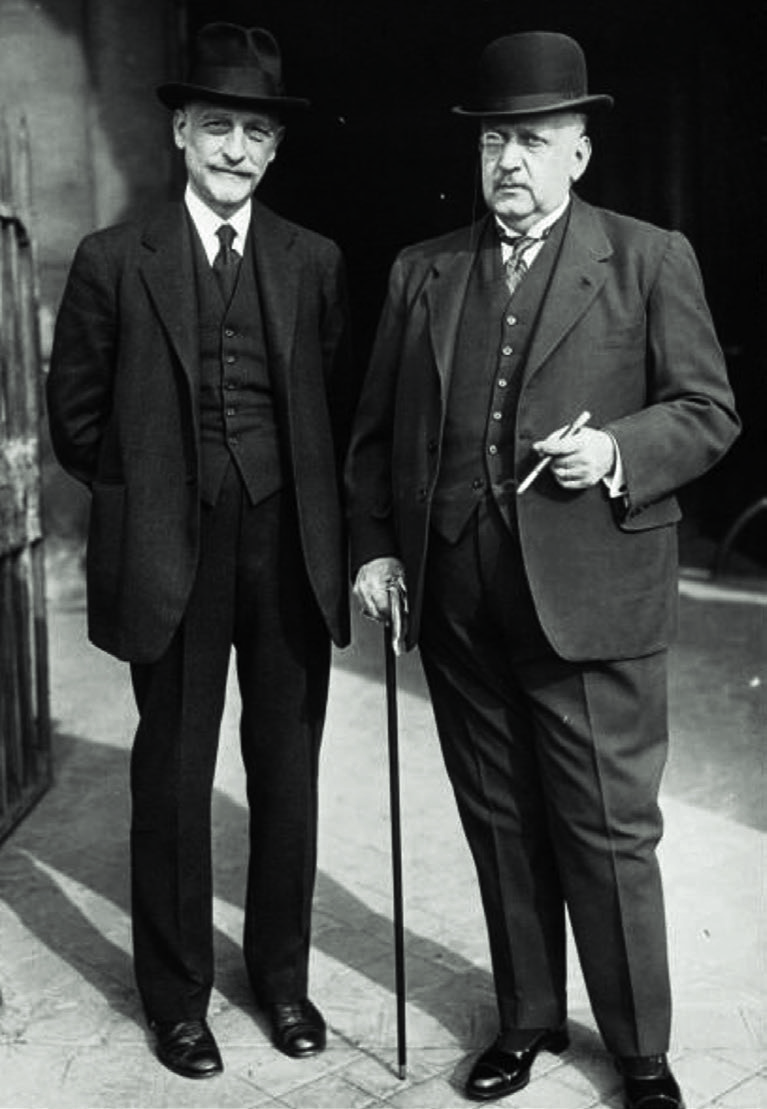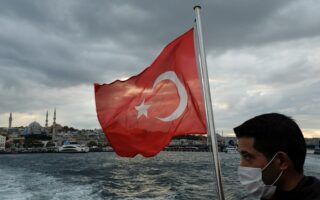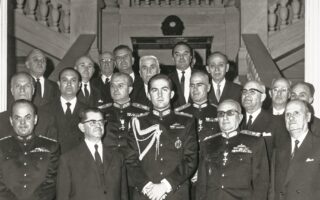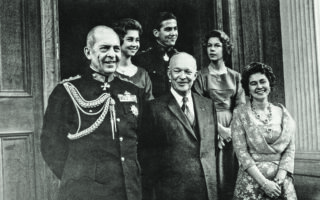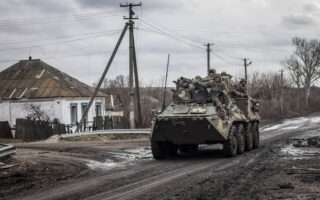Unanswered questions on the Asia Minor Campaign
How important was Greece’s isolation from its allies and the failed military operations that led to defeat and disaster?
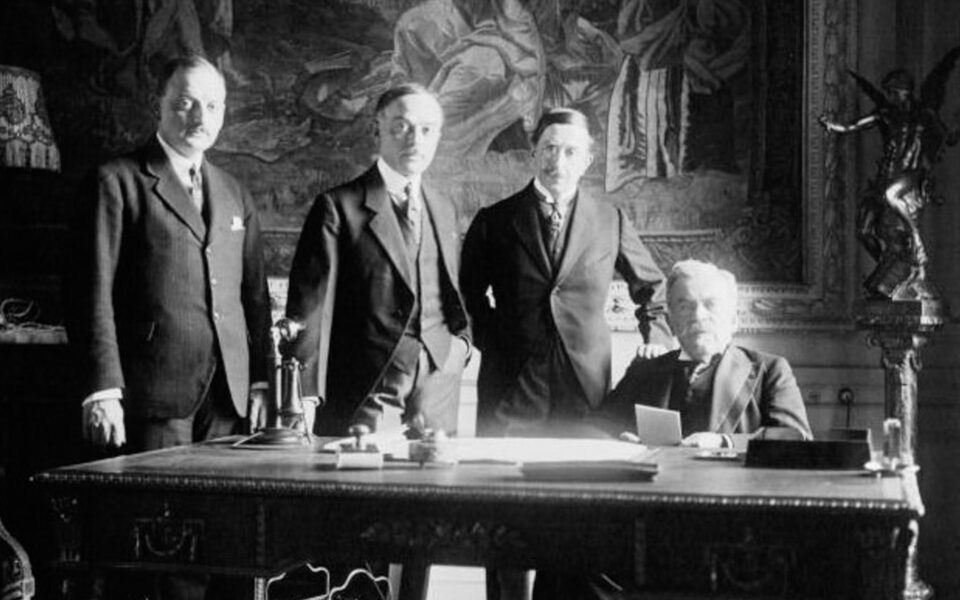
The disembarkation of Greek forces in Smyrna in May 1919 was accompanied by celebrations by the city’s ethnic Greek population. The docks were decked with Greek flags – such a great number in fact that many wondered where they came from. “We were sewing new flags every day,” said Filio Haidemenou, a refugee from Smyrna who was 20 at the time, in one of her last interviews.
Greece, with its morale renewed and with the consent of its allies, was setting out on a military campaign to protect the Greeks living on the western coastline of Asia Minor, with the ultimate goal being the future control of Smyrna and the surrounding area. The outlook was favorable.
However, three years later the Asia Minor Campaign concluded in the worst possible way, with the collapse of the military front and the destruction of Smyrna. The lives of thousands of people, among them Filio Haidemenou, were changed forever in the span of just a few days.
Indicative of this shifting mood against Greece was a meeting between the Great Powers and Greek and Turkish representatives that is oft forgotten. This was an attempt to partially revise the Treaty of Sevres that took place in London in February 1921. As historian Iakovos Michailidis points out (“Asia Minor Disaster,” Papadopoulos), “it was clear that the prevailing mood over the Greeks had soured, even if there were plenty of gestures of allied solidarity on a surface level.”
The talks dragged on for many days until early March, with the British suggesting a compromise with the Turks and territorial concessions in areas with higher proportions of Muslim populations. The Greek troops continued their offensive push toward Afyonkarahisar and Eskisehir, while in August of the same year they began to cross the Salt Desert.
Where was this campaign, which began with the most promising conditions for the Greek forces, decided? This question is one of the hardest to answer.
A war, historians say, is seldom decided by a single factor. However, if we try to focus on the big picture, putting aside other difficulties like Greece’s financial situation, the National Schism (the political division between the Venizelists and the Anti-Venizelists), political infighting within the Hellenic Army, and the difficulties and hardships faced by the soldiers, then only two fronts are left: diplomacy and arms.
Four historians discuss one of the most critical questions of the Asia Minor Campaign.
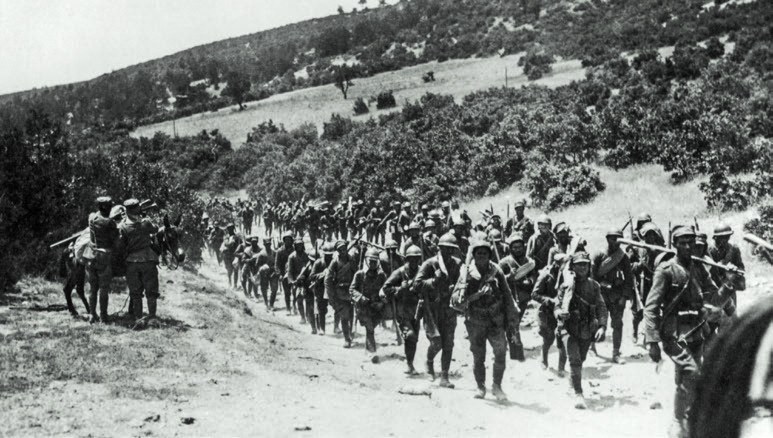
 Angelos Syrigos: The result was primarily decided on a military level
Angelos Syrigos: The result was primarily decided on a military level
The answer is obvious: The Asia Minor Campaign was primarily decided on a military level. Diplomacy (as an instrument of politics) played its part. It overturned the secret agreements over the partition of the Ottoman Empire and the zones of influence between the Great Powers that were forged during the First World War. Diplomacy allowed the disembarkation of the Hellenic Army in Smyrna in 1919 to restore order. It granted the administration of Smyrna and the surrounding area to Greece for five years with the Treaty of Sevres, after which sovereignty over the region could have been granted to Greece by a decision of the League of Nations and the agreement of the local legislative body. It founded a state for the Armenians in the eastern territories of Asia Minor.
But (a big BUT) the implementation of the Treaty of Sevres depended on the military defeat of Kemal. In the beginning, the Young Turk movement, which later developed into the Kemal movement, was not particularly popular with the Muslim population of Asia Minor. The situation changed following the arrival of the Hellenic Army in Smyrna. The majority of Turks sided with Kemal and reinforced his ranks. Thus, the forces of Kemal were in a position to challenge the provisions of the Treaty of Sevres despite facing the French in Cilicia, the British near the straits, the Armenians to the east, the Italians on the Asia Minor coast facing the Dodecanese (Caria and Lycia), and the Greeks in Ionia.
The real question is which of these allied nations were willing to implement the Treaty of Sevres against the Kemalist forces. The states with interests in the area were Great Britain, France, Italy and Greece. The Armenians, a potential Greek ally, did not have their own state and found themselves fighting both the Turks and Soviets alone and were defeated by the end of 1920.
The three Great Powers had been exhausted by the battles of the First World War. Their war dead numbered 750,000 soldiers for Great Britain, 1,350,000 for the French, and 460,000 Italians. Their societies demanded the immediate discharge of troops and the return of reservists to their homes, and not the continuation of bloody hostilities in the lands of the Ottoman Empire. Additionally, there began an Anglo-French competition over control of the Near and Middle East. It was clear that Greece was part of the British sphere of influence. This made France treat Greece with suspicion. The situation was exacerbated following armed clashes between the French and the Kemalists in the region of Cilicia. The French were convinced that continued hostilities would be a particularly bloody affair and preferred to find a settlement with Kemal to sacrificing more lives. On the other hand, Italy was convinced that it had been treated unjustly with the signing of the Treaty of Sevres. In fact, Italy considered that Greece, which was seen as a direct competitor, had been favored at its expense. As a result, Italy adopted a clearly anti-Greek stance. This meant that Greece found itself alone in imposing the provisions of the Sevres Treaty on the Ottoman Empire and this could only be achieved through the use of arms.
The return of King Constantine after the elections of November 1920 made the situation on the battlefield for the Greeks much worse. France (a sworn enemy of Constantine) and Italy had the perfect excuse to distance themselves from the Treaty of Sevres, which they utilized. It began with France surrendering its heavy armaments in Cilicia to Kemal. Italy also provided refuge to groups of Kemalists that were being pursued by the Greek forces. Starting in October 1921, French and Italian merchant ships (that is allied ships, which could not be searched by the Hellenic Navy) began transporting military equipment to Kemal through the ports of Mersin and Antalya (protected by France and Italy respectively).
Moreover, starting from March 1921 the Kemalists were also supported by the Soviet Union. The Soviets saw in Turkey an anti-imperialist movement that was fighting the two main capitalist powers in Europe: Great Britain and France. Soviet aid took the form of millions of gold rubles and more importantly, arms and ammunition.
Through these extremely difficult conditions, Greece fought alone while also experiencing the National Schism. The Allies made diplomatic efforts to find a solution from 1920 through to the end of the Asia Minor Campaign. They just confirmed that the Treaty of Sevres was going to be revised. The extent of this revision was defined by the collapse of the Hellenic Army in August 1922 and, unfortunately, the crushing defeat.
Angelos Syrigos is Greece’s deputy minister of education, an MP for Athens, and an associate professor of international law and foreign policy at Panteion University.
 Michael Llewellyn-Smith: Disaster had many causes, including financial exhaustion
Michael Llewellyn-Smith: Disaster had many causes, including financial exhaustion
Winston Churchill, serving as secretary of state for the colonies for the coalition government of David Lloyd George, was keenly interested in the conflict between Greeks and Turks in Asia Minor. He commented that “Venizelos is entitled to plead that in going to Smyrna he acted as mandatory for the four greatest Powers. But he went as readily as a duck will swim” (“The Aftermath”).
Churchill was closely aligned with British Prime Minister Lloyd George, even if they often disagreed as happened with the Asia Minor Campaign. These disagreements did not deter Lloyd George from implementing a policy that supported Greece, but they surely impeded it. And it was not the only problem. Other British ministers and officials also opposed the Greek landing and subsequent military campaign.
Among them was Edwin Montagu, secretary of state for India, who was wary of the consequences of Greek military operations on the public opinion of Muslim communities, as well as Sir Henry Wilson, who directly told Venizelos that the war would ruin his country. I am focusing on the British case, as without British support the Greek operation was doomed. Venizelos was aware of this. Allied support was the cornerstone of his policy. However, gradually all other allies distanced themselves, leaving Britain and Lloyd George alone in supporting him.
Conflict between the Greeks and Turks began when the Hellenic Army disembarked at Smyrna in May 1919. The idea can be traced back to a proposal by Edward Grey, the British foreign secretary, for important concessions of territory in Asia Minor to the Greek state. Grey’s proposal took place in January 1915, amidst the pressing concerns of the First World War and the British search for wider alliances.
King Constantine opposed Grey’s offer and it was eventually rejected. However, it had created a new possibility that led Venizelos to insist on his policy and support for the Entente. This sequence of events cuts from January 1915 straight through the manifestation of the National Schism, the conflict on the Macedonian Front (as part of the wider First World War) and the Paris Peace Conference of 1919. There, Greece as one of the victorious allied states, could claim western Asia Minor. In May 1919, Lloyd George, French Premier Georges Clemenceau and United States President Woodrow Wilson authorized Venizelos to land troops in Smyrna. This was the point of no return. This would not change when Venizelos was defeated in the elections of November 1920, as Dimitrios Gounaris and his unfortunate government continued the same policy that was dependent on British support. It was not the burning of Smyrna that ended this affair, but the Treaty of Lausanne in 1923 and the subsequent exchange of populations.
On the one hand, military operations on the field were decisive. The collapse of the Hellenic Army in the summer of 1922 was what led to the retreat from Asia Minor. However, the military dimension was always closely linked to the fields of politics and diplomacy. Politics and diplomacy are what gave Greece the opportunity to disembark troops in Asia Minor. Venizelos, due to his skills, had cultivated good relations with Lloyd George, Clemenceau and Wilson. The disaster of 1922 had many causes, among them financial exhaustion. Subsequently, it is several factors that led to the failure of the Greek military operation.
Lloyd George, who looked omnipotent in Paris in 1919, lost much of his power as time went on. He continued to believe in the Greek cause. However, he was very isolated in his own coalition government, and had several other issues to confront. Ultimately, Greek control of Asia Minor was not a vital British interest. There were others, if not more, vital concerns: relations between Britain and France, Russia, and Ireland, the promotion of social peace, and the process of reintegrating discharged soldiers back home.
Differences that erupted during meetings of the Allies worked against Greece. France completely turned against Greece after the elections of 1920 and the return of King Constantine. In any case, France was always more concerned with Syria and issues further east than Asia Minor. By the end of 1920, France was ready to sign a treaty with the Turkish nationalists and withdraw its troops from Cilicia. The United States exited the stage after President Wilson returned home and his health deteriorated. Above all, the diplomacy of Mustafa Kemal was also an important factor, as he took advantage of Soviet Russia’s policy of turning against the Entente. Additionally, the concentration of Turkish forces and diplomatic resources in the interior of Asia Minor reached a point in the summer of 1922 where it could threaten a mass counterattack.
In other words, the situation, as it developed between 1920 and 1922, turned, fatefully, against the Greeks and for the cause of Turkish nationalism. This made the success of the Greek military operations impossible. Diplomacy won out over arms.
Michael Llewellyn-Smith is a historian and the former ambassador of the United Kingdom to Greece.
 Tasos Sakellaropoulos: The army was an instrument of diplomacy and politics
Tasos Sakellaropoulos: The army was an instrument of diplomacy and politics
The Asia Minor Campaign was one of the consequences of the successful participation of a (divided) Greece on the side of the victorious Great Powers of the First World War. However, for the Great Powers the campaign coincided with the end of the war and the settling of issues that were left in its wake, like serious geopolitical concerns associated with the collapsing Ottoman Empire. For Greece, the campaign meant the beginning of a new political, diplomatic and military phase. A completely new period that was not part of an international war, difficult and mystifying, in which Greece acted alone. A period that began as a diplomatic success and finally concluded as a military disaster, after the country was diplomatically shunned by its allies.
The disembarkation of the Hellenic Army in Smyrna in May 1919 set in motion two incompatible realities: that of the Allies and that of Greeks, and not only those Greeks who lived in the Greek state, but also those in Asia Minor, the Pontus region and Eastern Thrace. Two incompatible realities that only Greek diplomacy on the international stage and domestic politics could bring together. The Venizelos government had moved successfully in this direction up until November 1920, when in the aftermath of the Great War and Greece’s participation in it it still maintained a positive dynamic for diplomacy and fruitful links with the Great Powers. Subsequent governments of the anti-Venizelist camp overturned this mild and tremendously cautious wartime policy of Venizelos when it came to the expansion of the Greek zone of control. Starting in March 1921, they moved to exterminate the fledgling Turkish Army by extending the zone of operations. This was a very difficult goal as the Turkish soldiers were fighting with high morale and possessed a feeling of national duty, due to the policies of Kemal, and were fighting on familiar ground and core territory. Additionally, they gradually started to enjoy the tolerance and even indirect support and recognition of several of the Allies, a reality that upset all Greek planning. This, in addition to their upgraded equipment, the concentration of numerous fresh military forces, and primarily the endless depth of field they possessed for retreats and maneuvers that wore down and exhausted the Greek forces, gave the new national Turkish Army absolute control of all initiatives and diversions on the field of battle.
Additionally, the post-November governments put out vapid optimism domestically and misinterpreted the stance of the Allies as served their needs, despite their clear distancing from Greek plans. The Greek governments judged that the military value of the Hellenic Army alone would present a fait accompli to the Allies as well as the young and powerful cause of Turkish nationalism over Turkish territory, and as a result they disregarded the political process of the issue at home and refused to adapt their policy in step with the international dimension that had changed drastically. After all, the unsuccessful expansion of operations in Asia Minor reinforced the Turkish position and led all negotiations toward an impasse, negotiations that could have potentially allowed for a more restricted Greek presence in Asia Minor or at least an agreement over the Greek populations, or in any case an agreement that would allow a relatively equal participation by Greece. Difficult decisions for governments that did not process and politically manage the visionary, but prickly, imperatives of Greek irredentism. Their work was difficult when they could not, and probably did not want to, shape the conceited idea of the Megali Idea that had been dominant for decades in a politically applicable framework. It was a difficult task for the anti-Venizelist governments who did not want to accept the fact that the successful policy of Venizelos that expanded Greece between 1912 and 1919 was based on regional and international alliances, political pragmatism, aligning with the interests of the Great Powers, and the ability to cultivate in the public a feeling of participation (at least until the elections of November 1920). To this end, the army was an instrument of politics and diplomacy and not an autonomous tool of stagnant national problems, as they wanted to use it.
The solution of “figuring it out as we go along,” which was implemented in Asia Minor by the Greek governments following the elections of November, 1920, that is taking action depending on the circumstances, deprived them of the ability of managing the developments in favor of the Greek presence in the region. It distanced them from the harsh reality, which stated that diplomacy was the precondition to materialize the visions of a small but ambitious country like Greece. It was the diplomatic stage that featured the national confirmation of 1919 and the Treaty of Sevres of 1920, it was also this same stage that would feature the national collapse. The fact that only politics and diplomacy could bridge the gap between the goals, capabilities and visions of Greece and the interests and intentions of the Great Powers was completely ignored.
Tasos Sakellaropoulos is a historian and head of the Benaki Museum Historical Archives, Athens.
 Evanthis Hatzivassiliou : A combination of factors led to the defeat
Evanthis Hatzivassiliou : A combination of factors led to the defeat
There has almost never been a war in the entirety of human history that was decided by a single factor. War is the ultimate challenge for a society (particularly during the industrial era) and its outcome depends on several factors, including the material factor (economic and demographic) of the combatants, their access to cutting-edge technology, adequate planning and organization, the training of its officials, the morale and cohesion of its home front, geography, international support and alliances, and others. Even the consequences of a military defeat can be overturned by a society that possesses a strong economic, technological, organizational and ideological foundation, as well as international support. Even a significant victory in the early stages will not prove enough if a society does not meet these conditions and their enemy does. For example, it was not the defeat at the Battle of Manzikert alone that caused the collapse of Byzantium at the end of the 11th century, and the inconceivable disaster in France in 1940 was not enough to break Britain. To put it simply, a victory is only decisive if the opponent no longer has the forces, that is the other factors, to overturn its consequences.
The Asia Minor Campaign was no exception to this rule. The initial planning of this Ionian endeavor by Venizelos was grounded in such a combination of factors including Greece’s identity as a victor of the Great War, the existence of a broad international network that Venizelos sought to utilize, the perceived decision of the Great Powers to carve up the Ottoman Empire (including the “core” territories of Asia Minor), the emergence of a friendly Armenian state, and the significant Greek military superiority against any Turkish reaction. However, until November 1920, it is accurate to refer to this as an Ionian endeavor by Greece – one that was certainly military in nature – but it must be differentiated from the large offensive actions that began in early 1921.
There are huge differences between these two phases. The elections of November 1920 and the return of King Constantine decisively contributed to the international isolation of Greece, while paving the way for the Kemalist movement to get international support, starting with the Soviet Union. This developing international isolation (that eliminated the initial Greek military superiority while exacerbating economic woes) pushed the post-November governments to undertake this huge military operation toward Ankara. Its goal was not to conquer and occupy these territories, but to trap and eliminate the Kemalist forces while also destroying their supply lines and lines of communication. Greece undertook that large offensive on its own at that point, with international support growing weaker. Thus, the goal of the 1921 campaign was to fight a decisive battle that would eliminate the enemy or throw them into disarray. Usually, this strategy is a sign of weakness as it means that the side utilizing it is trying to reverse a sequence of events and correlations that are increasingly turning against it.
We do not know, and we cannot theorize, what would have happened if Kemal had waited to be caught. He did not. Neither does this author believe that the occupation of Ankara would have led to a Turkish defeat. They could have always retreated further to the east. Kutuzov had done it in Russia in 1812 when Napoleon entered Moscow but lost the war. In other words, there was no military solution to the problem that was attempted to solve with military means in 1921. The great heroism displayed by the army during the brutal battles of 1921 could not overturn the fundamental issues.
There were of course military factors that contributed to the defeat. Among them were the long supply lines, the lack of initiative shown for almost a year, with the army spread thinly over a huge front (allowing Kemal to concentrate his forces in the most important sectors and achieve there the required military superiority), the lack of available reserves in crucial sectors, and of course the National Schism that led to the discharge of many capable officers who supported the “other” side.
However, this author must insist that the cause of the defeat was not solely a military issue. The post-November governments did not possess the overall perception of Venizelos when it came to the international system, nor did they possess his skills to manage its difficulties. The causes of the defeat indicate a combination of a factors, from the bad judgment of how international support would factor in the conflict, wrong decisions (both military and political), economic difficulties, and, perhaps most importantly, the inability to maintain a cohesive home front due to the National Schism.
Evanthis Hatzivassiliou is a professor at the University of Athens and secretary-general of the Hellenic Parliament Foundation for Parliamentarism and Democracy.
